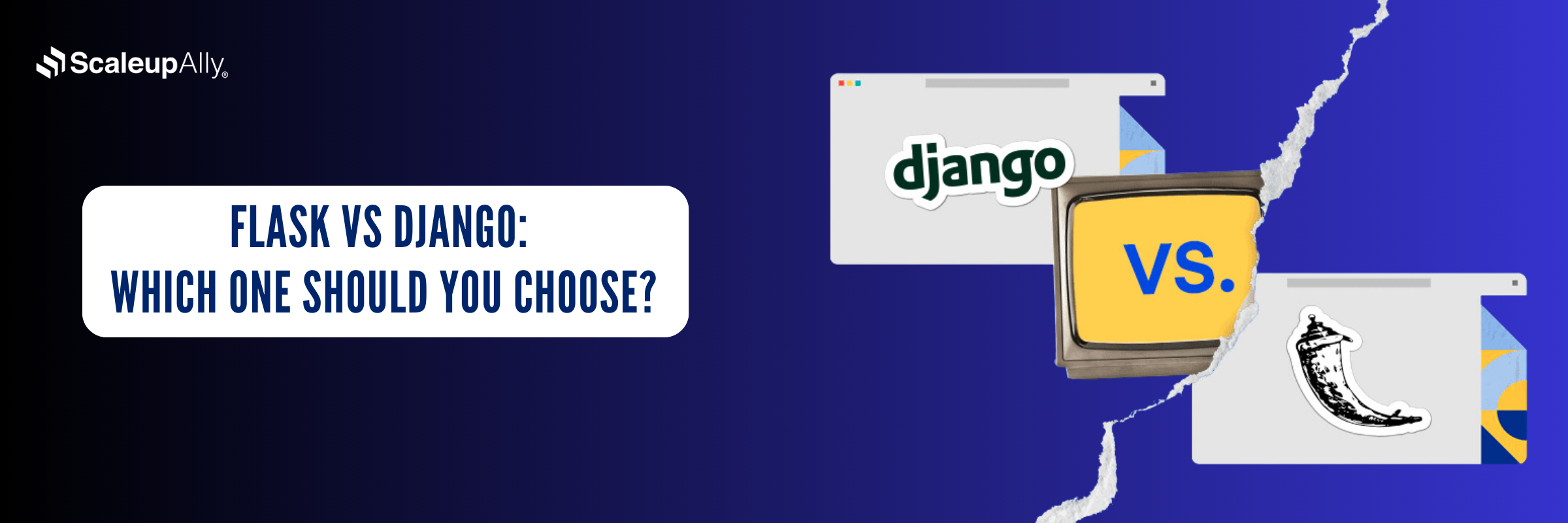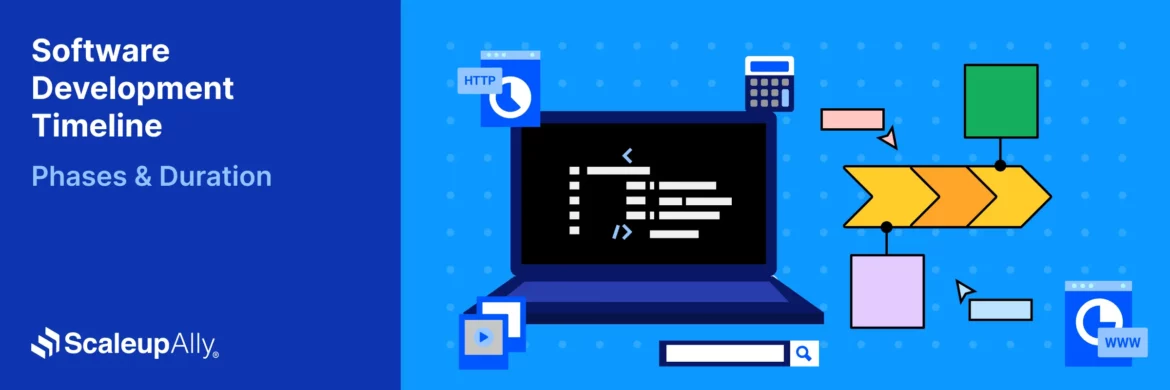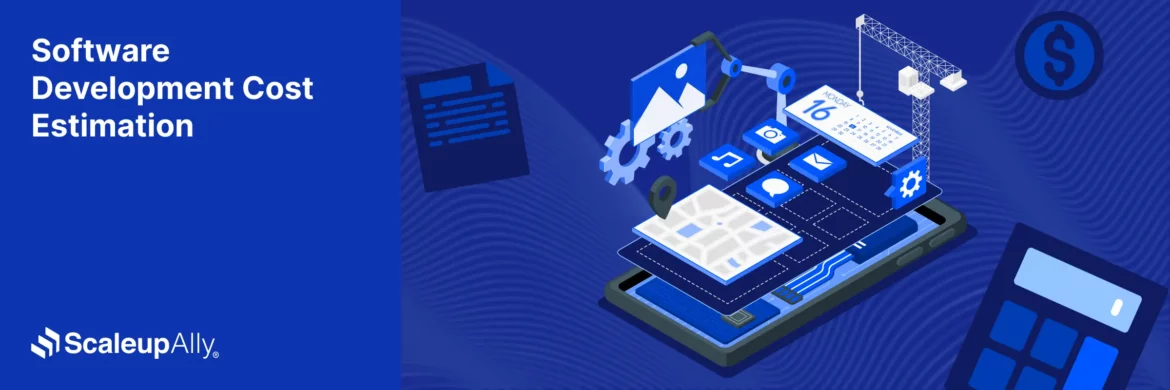
Flask vs Django: Which One Should You Choose?
ScaleupAlly Team | March 31, 2025 , 10 min read
Table Of Content
When we talk about web development, that too python, names we usually heard are Flask and Django. Both are most in demand and are powerful frameworks, but their needs and development style is different and unique.
Flask allows developers the flexibility to build applications from scratch. Also, Django is often supported to do full stack development and offer a complete solution.
This blog will help you to figure out the differences and use cases between both the frameworks and after knowing the advantages of both, you can decide between flask and Django, which one to use for your next project.
Key Takeaways
- Django is a full stack developing framework used to build for rapid development, it also offers other built in features like authentication, working in admin panel, ORM etc.
- Flask is a micro framework made with lightweight features, it helps in customizing applications using various third party tools support.
- Flask is more into minimalism and modularity while Django supports batteries-included features.
- To deal with small projects, micro services, or APIs dealing one can choose flask, whereas to handle complex applications, complex and data driven apps it’s better to go for Django.
- Both of the frameworks have the strong base of python, helpful in dealing with RESTful API development.
What is Django?
Django is a high- level python framework. It follows MVC pattern, i.e. (Model-View-Controller) architecture or better to say it uses MVT – Model view Template structure. It follows the approach termed as ‘batteries included’. So batteries included implies that python is all ready to start like. Python has a rich and versatile library. Its standard library has a large set of modules, functions, data types where you do not need to do any additional downloads. Python is like the product comes with all the possible parts together used for better compatibility. And using this philosophy, python is treated as giving a direct head start to the project.
Key Features of Django
- Authentication: It has its built-in user authentication and authorization functionality to provide the access.
- Scalability: It’s managed in such a way to handle complex and wide variety scaled applications.
- ORM: Termed as object relational mapper, helps in simplifying database operations and structure. Also supports enabling developers to connect with databases using python projects.
- Admin Panel: It has automated features for generating admin interfaces to manage data and its working.
- Data Security: Helps in providing security features, protects against SQL injection and other vulnerabilities.
Pros of Django
- Security: This is the major and advanced advantage of Django. It includes clickjacking, XSS, CSRF, HTTPS etc. which ensures the protection level in coding standards.
- Documentation: Provides the best set of documentation practice among various open source frameworks. It’s well written and formatted for the use of web developers for starting with python.
- High speed and scalability: It helps developers to build a scalable and accurate website. It accelerates development with lots of built-in components.
Cons of Django
- Overskill for small projects: Due to the high-level framework and complex features, Django is more bends towards complicated projects. For small and light projects, flask is preferred for web developers to use.
- Order of work: Django is too vast sometimes so it requires to plan the whole structure and then perform the tasks in small units.
What is Flask?
Flask is a micro framework designed using python as a base. It is designed to provide the essential tools for web development. This is a lightweight and flexible framework by nature. It is simple to use for web development and web applications using python programming language. It provides minimalistic design and rich features to the website which makes it a good choice for development.
Unlike Django, it does not include built in features like ORM due to this, it allows developers to use libraries and their tools as their own choice.
Key Features of Flask
- This is lightweight by nature, and provides flexibility with python as a programming language.
- It uses Jinja2 template engine for rendering HTML and other dynamic content generation web pages.
- It simplifies the creation of RESTful APIs in a smooth format.
- WSGI compliance has a toolkit which is used for handling requests and responses.
- It provides the built-in server, debugger support to identify errors, easy customization, and it’s better fit for smaller web applications.
- It includes a built-in development server which also allows quick testing and iteration without needing any other external servers.
- Lots of extensions available for flask, it helps in enabling functionalities like database management, user and authentication processes etc.
- It helps in building quick prototypes and testing objects. It has a high level of customization that helps in simple dealing of developers.
Pros of Flask
- Easy to learn for beginners.
- Lightweight and flexible in nature.
- Simple prototyping
- Ideal for small-scale projects
Cons of Flask
- Requires additional configurations
- Lack in built-in tools
- Need additional efforts like third party APIs
- Not much suitable for large level applications
Flask v/s Django: A Detailed Comparison
1. Full-Stack vs. Micro-framework
| Aspect | Django | Flask |
|---|---|---|
| Type of Framework | Full-stack | Micro-framework |
| Features | ORM, admin panel, authentication | Minimal core functionality |
| Philosophy | Includes Battery | Flexible and Minimal to use |
2. Use Cases
| Django | Flask | Flask |
|---|---|---|
| Works in Large-scale, Mostly deals in database-driven applications | Deals in Small projects, APIs, and microservices | Micro-framework |
| E-commerce and complicated platforms | Data science and machine learning apps | Minimal core functionality |
| Content management systems (CMS) | Prototyping and minimalistic applications | Flexible and Minimal to use |
3. Ease of Use
| Aspect | Django | Flask |
|---|---|---|
| Learning Curve | Medium to high | Easy for beginners |
| Setup | Pre-configurations already in-built | manual configuration is needed |
4. Ecosystem and Community
Both the framework Flask and Django, have a large set of active communities. Django on the one end, is full of pre-built and built- in tools, Flask on the other end, mostly dependent on additional extensions and third party tools like flask login, flask SQLAlchemy.
5. Scalability and Performance
Both of the frameworks have crucial scalability. Flask on the one hand, is light weight which gives better performance for small applications, Django framework supports and shines in large scale projects.
When to Choose Django
Django is considered as a high-level web framework that helps in giving flexibility for built-in features for rapid development and scalability. Following are the scenarios where you can consider Django:
- Implementation of complex code – when project requirements are handling complex business logic, data processing, or an advanced backend structure, Django provides robust framework which can help managing this complexity efficiently.
- Design a complicated, data-driven web or mobile application – Applications that depends on heavy database support systems and interactions, user management, or analytics dashboards from Django’s ORM (Object-Relational Mapping).
- Using tools like admin panel, authentication, ORM etc – Django comes with many of the functionalities like handling an admin panel, authentication system, session handling, and ORM, making it easy and smooth to manage users, permissions, and database models without writing everything from scratch.
- Required for rapid and fast development – Django uses multiple components which are ready to use as it follows the “batteries-included” approach which makes the performance rate faster and due to this feature it is a great choice for startups and businesses looking to start their projects quickly.
Example Applications
- Heavy loaded portals
- Social media platform management
- E-commerce platforms
- News portals
- Large scale websites
When to Choose Flask?
Flask is a lightweight micro-framework which has the flexibility that can be best applied for simple applications and services. One can choose Flask in the following cases:
- Looking for micro services – Flask is a good choice for microservices-based architectures where users need to build lightweight APIs that interact with different components and services. Its flexibility is helpful for developers too, to manage and customize API endpoints as per the requirement.
- Dealing with lightweight APIs – If you are working on a simple web application, or a single landing page, or small project that doesn’t require the use of a full framework, Flask is the good choice to choose as it keeps things minimal and lightweight.
- Building minimalistic applications – Flask has full support and complete freedom in choosing tools and libraries. If your project has specific requirements that don’t perfectly fit with Django’s predefined structure, Flask allows you to do better modification as per the need of your application.
- Prototyping – If you want to deal with a quick prototype or a Minimum Viable Product (MVP) to check with your ideal thought, Flask’s has a minimalistic approach which allows you for rapid development with minimal setup.
Example Applications
- RESTful APIs
- Machine learning
- Data visualization dashboards
- Architecture for micro services
Python Django v/s Flask: Which One is Right for You?
Selecting an option between Django and flask, totally depends on the requirement of your project and expertise of your team. Both of the frameworks have a base of python programming language and can give the best solution for your clients needs.
If a team of beginners is looking for a framework that can handle heavy loads, Django is a better choice to choose. On the other hand, if project requirements are more towards simplicity and flexibility, experienced developers may choose flask for unique solutions.
Conclusion
By going through the basic concepts and analyzing strengths and weaknesses of Flask and Django, you can make a better decision for your project’s needs. Whether you choose for Django’s advanced tools or Flask’s simplicity, both frameworks provide robust solutions for modern web development.
To turn that decision into a successful implementation, companies like ScaleupAlly provide end-to-end web development services tailored to your chosen tech stack—ensuring your application is scalable, secure, and future-ready.
Frequently Asked Questions
Q: Is Flask better than Django?
Flask and Django both work on different types of needs. Flask is mostly suitable for light weight and small projects, APIs, while Django works well in large projects and data-driven applications.
Q: Which is better, Flask or Django or FastAPI?
So again, the choice depends on the type of project. If project needs are based on small requirements, Flask is a good choice to go for. If the project needs is based on a large type where the platform is bit heavy, Django can be chosen for the full-stack development, and in case of FastAPI, it’s preferred for high-performance APIs.
Q: Is Flask for frontend or backend?
Flask is known for handling backend, for developing web applications and APIs. It does not deal with frontend development directly but helps in rendering templates for frontend requirement and use.
Q: Can we use Flask and Django together?
Yes, Flask and Django can work together on a project. For example, Flask can be used for managing lightweight APIs, while Django can handle the primary part of an application.
Author Spotlight
Kiran Saklani, Software Engineer
Related Blogs

Top 20 Emerging Technologies of 2026
Discover the top 20 emerging technologies of 2026. Explore which innovations are driving change across healthcare, finance, manufacturing, and other crucial industries.
ScaleupAlly Team
Dec 16 ,
9 min read

Software Development Timeline: Phases, Duration & Estimation Guide
Understand the software development timeline with phase durations, key factors, hidden delays, and practical methods to estimate project time.
Suprabhat Sen
Nov 29 ,
16 min read

Software Development Cost Estimation Guide: What’s Included & What Affects the Price
Explore software development cost components, major pricing factors, and practical estimation methods to plan your project accurately from start to finish.
Suprabhat Sen
Nov 29 ,
14 min read


